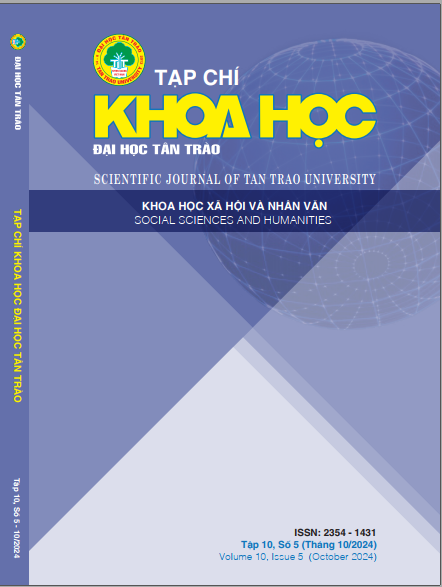VTHE ROLE OF CULTURE IN ECONOMIC DEVELOPMENT IN VIETNAM IN THE CURRENT CONTEXT OF INTERNATIONAL INTEGRATION
DOI:
https://doi.org/10.51453/2354-1431/2024/1267Abstract
Promoting the role of culture to promote economic development is an inevitable trend in the 4.0 era, in the current global and integrated context. Culture is not only a reflection of economic activity, but it has always been relatively independent and, moreover, culture has a great impact of orientation and adjustment. From the published research results, relevant documents and from practical research, through analysis and synthesis of scientific arguments to come up with oriented solutions to promote the role of culture as a driving factor, objectives, orientations and areas that directly contribute to economic growth in the current context.
Downloads
References
Communist Party of Vietnam (2014), Document of the Ninth Meeting of the Central Committee (Session XI), Office of the Party Central Committee.
Communist Party of Vietnam (2021), Document of the 13th National Congress, Volume I, Volume II, National Political Publishing House, Hanoi.
Le Quoc Ly, Le Quoc (2023), The Relationship between Economy and Culture - Theoretical and Practical Issues in Vietnam Today, National Political Truth Publishing House, Hanoi.
National Committee for the International Decade for Cultural Development (1992), World Decade for Cultural Development, Ministry of Culture and Information Publishing House, Hanoi.
Nguyen Duy Bac, Vu Thi Phuong Hau (Co-editors) (2023), Promoting cultural values and Vietnamese human strength in the construction and development of the country (Monograph), National Political Publishing House of Truth, Hanoi.
Nguyen Thi Thu Ha (2017), "Policies for the Conservation and Promotion of Japan's Intangible Cultural Heritage", Journal of Cultural Heritage, No. 58, pp.107-110.
Nguyen Toan Thang, Vu Thi Phuong Hau (Editor), (2018), Culture and Development, Political Theory Publishing House, Hanoi.
Nguyen Phu Trong (2022), Some theoretical and practical issues on socialism and the path to socialism in Vietnam, National Politics Truth Publishing House, Hanoi.
Nguyen Hong Vinh (2023), Vietnamese Culture and People in the Integration Period, National Political Truth Publishing House, Hanoi.
Tran Thi Thuy Van (2024), Brand Culture - Endogenous Resources of Vietnamese Enterprises (Monograph), National Political Publishing House TruthHanoi.
Trinh Thi Hanh (2023), "The relationship between economic growth and cultural development in Vietnam today: Issues posed", http://www.vanhoanghethuat.vn/moi-quan-he-giua-tang-truong-kinh-te-va-phat-trien-van-hoa-o-viet-nam-hien-nay-nhung-van-de-dat-ra.htm, accessed on 28/02/2023.
Truong Quoc Binh (2014), Protecting and promoting the value of Vietnamese cultural heritage, Culture and Information Publishing House, Hanoi.
Vu Trong Lam (2023), "Culture is an important driving force for economic development", https://www.tapchicongsan.org.vn/web/guest/kinh-te/-/2018/827251/van-hoa-la-dong-luc-quan-trong-de-phat-trien-kinh-te.aspx, accessed on 11/4/2023.
Downloads
Published
How to Cite
Issue
Section
License

This work is licensed under a Creative Commons Attribution-ShareAlike 4.0 International License.
All articles published in SJTTU are licensed under a Creative Commons Attribution-ShareAlike 4.0 International (CC BY-SA) license. This means anyone is free to copy, transform, or redistribute articles for any lawful purpose in any medium, provided they give appropriate attribution to the original author(s) and SJTTU, link to the license, indicate if changes were made, and redistribute any derivative work under the same license.
Copyright on articles is retained by the respective author(s), without restrictions. A non-exclusive license is granted to SJTTU to publish the article and identify itself as its original publisher, along with the commercial right to include the article in a hardcopy issue for sale to libraries and individuals.
Although the conditions of the CC BY-SA license don't apply to authors (as the copyright holder of your article, you have no restrictions on your rights), by submitting to SJTTU, authors recognize the rights of readers, and must grant any third party the right to use their article to the extent provided by the license.


